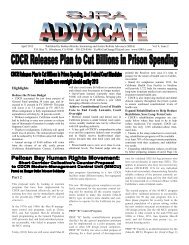Jailhouse Lawyer's Handbook - Sentencing and Justice Reform ...
Jailhouse Lawyer's Handbook - Sentencing and Justice Reform ...
Jailhouse Lawyer's Handbook - Sentencing and Justice Reform ...
Create successful ePaper yourself
Turn your PDF publications into a flip-book with our unique Google optimized e-Paper software.
deprived of a basic human need. Subjective evidence<br />
is evidence that the prison official you are suing knew<br />
you were being deprived <strong>and</strong> did not respond<br />
reasonably. You must show how you were injured <strong>and</strong><br />
prove that the deprivation of a basic need caused your<br />
injury.<br />
When you provide objective evidence, you must show<br />
that the condition(s) you are challenging could<br />
seriously affect your health or safety. In considering a<br />
condition, a court will think about how bad it is <strong>and</strong><br />
how long it has lasted. Barney v. Pulsipher, 143 F.3d<br />
1299, 1311 (10 th Cir. 1998). You must show that you<br />
were injured either physically or psychologically,<br />
though courts do not agree on how severe the injury<br />
must be. You may challenge conditions even without<br />
an injury if you can show that the condition puts you at<br />
serious risk for an injury in the future. Helling v.<br />
McKinney, 509 U.S. 25 (1993).<br />
When you provide subjective evidence, you must<br />
show that the official you are suing acted with<br />
“deliberate indifference.” Wilson v. Seiter, 501 U.S.<br />
294 (1991). This means that the official knew of the<br />
condition <strong>and</strong> did not respond to it in a reasonable<br />
manner. Farmer v. Brennan, 511 U.S. 825 (1994). One<br />
way to show this is by proving that the condition was<br />
so obvious that the official must have purposefully<br />
ignored it to not know about it. Courts will also<br />
consider any complaints or grievance reports that you<br />
or other prisoners have filed, Vance v. Peters, 97 F.3d<br />
987 (7 th Cir. 1996), as well as prison records that refer<br />
to the problem. Prison officials cannot ignore a problem<br />
once it is brought to their attention. Prison officials may<br />
try to argue that the prison does not have enough<br />
money to fix problems, but courts have generally not<br />
accepted this defense (although the Supreme Court has<br />
not clearly addressed this defense yet). Spain v.<br />
Procunier, 600 F.2d 189 (9 th Cir. 1979). It is important<br />
to note that while there is a subjective component to<br />
Eighth Amendment claims, you do not need to show<br />
why prison officials acted as they did.<br />
As explained in other sections of this <strong>H<strong>and</strong>book</strong>, the<br />
PLRA bars claims for damages that rely on a showing<br />
of emotional or mental injury without a showing of<br />
physical injury. This provision should not affect your<br />
claim for injunctive relief from poor conditions.<br />
However it may be quite difficult to get money<br />
damages for exposure to unsafe or overly restrictive<br />
conditions unless they have caused you a physical<br />
injury. The courts are not in agreement on this issue, so<br />
you may want to just include these claims anyway, <strong>and</strong><br />
hope for the best.<br />
Here are some of the most common Eighth Amendment<br />
challenges to prison conditions:<br />
<br />
<br />
<br />
<br />
Food: Prisons are required to serve food that is<br />
nutritious <strong>and</strong> prepared under clean conditions.<br />
Robles v. Coughlin, 725 F.2d 12 (2d Cir. 1983). As<br />
long as the prison diet meets nutritional st<strong>and</strong>ards,<br />
prisons can serve pretty much whatever they want.<br />
They must, however, provide a special diet for<br />
prisoners whose health requires it <strong>and</strong> for prisoners<br />
whose religion requires it. See Part 2 of this<br />
section, on religious freedom.<br />
Exercise: Prisons must provide prisoners with<br />
opportunities for exercise outside of their cells.<br />
Keenan v. Hall, 83 F.3d 1083, 1089 (9 th Cir. 1996);<br />
Delaney v. DeTella, 256 F.3d 679 (7 th Cir. 2001).<br />
Courts have not agreed upon the minimum amount<br />
of time for exercise required, <strong>and</strong> it may be<br />
different depending on whether you are in the<br />
general population or segregation. One court has<br />
considered three hours per week adequate, Hosna<br />
v. Groose, 80 F.3d 298, 306 (8 th Cir. 1996), while<br />
another has approved of just one hour per week for<br />
a maximum security prisoner. Bailey v. Shillinger,<br />
828 F.2d 651 (10 th Cir. 1987). Some circuits have<br />
determined that prisoners cannot be deprived of<br />
outdoor exercise for long periods of time. LeMaire<br />
v. Maass, 12 F.3d 1444 (9 th Cir. 1993). Prisons<br />
must provide adequate space <strong>and</strong> equipment for<br />
exercise, but again, there is not clear st<strong>and</strong>ard for<br />
this. It is generally acceptable to limit exercise<br />
opportunities for a short time or during<br />
emergencies.<br />
Air Quality <strong>and</strong> Temperature: Prisoners have<br />
successfully challenged air quality when it posed a<br />
serious danger to their health, particularly in cases<br />
of secondh<strong>and</strong> smoke, Reilly v. Grayson, 310 F.3d<br />
519 (6 th Cir. 2002), Alvarado v. Litscher, 267 F.3d<br />
648 (7 th Cir. 2001) <strong>and</strong> asbestos, LaBounty v.<br />
Coughlin, 137 F.3d 68 (2d Cir. 1998). While you<br />
are not entitled to a specific air temperature, you<br />
should not be subjected to extreme hot or cold, <strong>and</strong><br />
should be given bedding <strong>and</strong> clothing appropriate<br />
for the temperature. Gaston v. Coughlin, 249 F.3d<br />
156 (2d Cir. 2001).<br />
Sanitation <strong>and</strong> Personal Hygiene: Prisoners are<br />
entitled to sanitary toilet facilities, DeSpain v.<br />
Uphoff, 264 F.3d 965 (10 th Cir. 2001), proper trash<br />
procedures, <strong>and</strong> basic supplies such as<br />
toothbrushes, toothpaste, soap, sanitary napkins,<br />
razors, <strong>and</strong> cleaning products.<br />
JAILHOUSE LAWYERS HANDBOOK – CHAPTER TWO<br />
24





